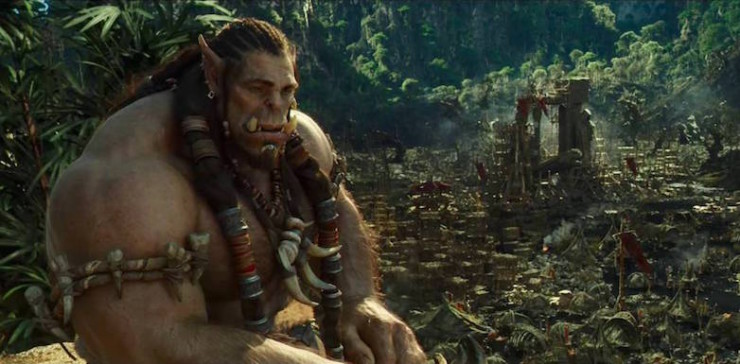The one and only time I played Warcraft it wasn’t even an MMO. In the distant past of the mid-90s early 2000s I spent a happy couple of days with Warcraft 3. It was fun. I built stuff. I got killed a lot. I moved on to other things.
A considerable amount of time and a massively successful, epochal MMO later, along comes Warcraft: The Movie. Or as it’s called on my side of the pond, Warcraft: The Beginning. Directed by Duncan Jones, from a script by Jones and Charles Leavitt it’s a big, expansive fantasy movie that has two impossible things to do: please a massive and pre-existing audience and bring new people in.
The first, I can’t speak to. The second? I can. Warcraft works for non-Warcraft-playing audiences. In fact, it’s one of the most narratively interesting blockbusters you’ll see this year.
Because Warcraft, very deliberately, is a tragedy.
The opening scene, a duel between a single human and an orc, makes this clear. The realm of Azeroth is, if not broken, then far from at peace—the film is the story of how it got there.
That story is told through multiple perspectives. The two primary ones are Durotan, played by Toby Kebbell, and Anduin Lothar, played by Travis Fimmel. Durotan is an orc chieftain and part of the initial strike force sent to Azeroth, along with his pregnant wife. Lothar is a (human) veteran soldier, close friend of the king and another chance for Fimmel to show us just how good he is at playing soft-voiced, slightly insane badasses.
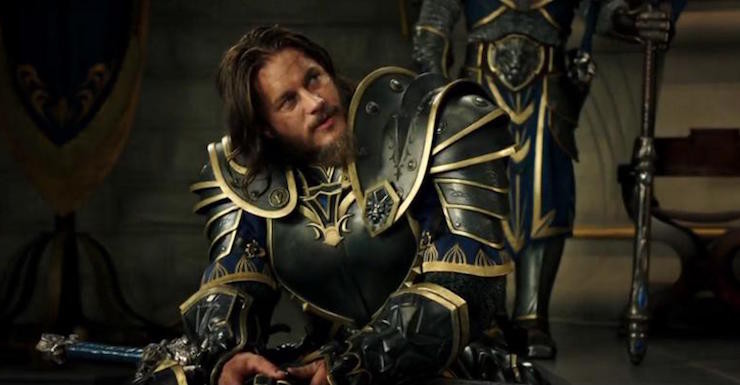
The film works hard to give the Alliance and the Horde, the two factions that these characters embody, equal screen time, and it’s at its most successful when it delves into these warring cultures. The Alliance are a kind of fantasy United Federation of Planets. They have technology, allies across the world, and have achieved a hard-won peace. They also—in a magnificent coincidence of casting—are ruled by King Llane Wrynn and Queen Lady Taria Wrynn, played by Dominic Cooper and Ruth Negga.
Yes, the Alliance is ruled by Jesse Custer and Tulip.
But the Horde is where the film really gets its narrative feet under it. A fractious collection of clans from their broken world, the Horde could easily have been a faceless enemy or even (as orcs so often are) a comedic one. Instead, Jones and Leavitt show us the society behind the savagery and the desperate need that some orcs have for life to be more than violence.
Most of the heavy lifting on this side is done by Kebbell’s Durotan and Rob Kazinsky’s Orgrim. Old friends, the two have an easy, relaxed friendship based on their shared intelligence. Their clan are good orcs: they fight hard, kill well, and are united behind Durotan. But the magic, and death, that brings them to Azeroth curdles their society from the inside out, and Durotan and Orgrim are two of the few who realize that.
Durotan in particular is a fascinating lead, a chieftain who wants something more for his people and takes stumbling, uncertain steps towards achieving it. The way his plot pays off is especially interesting, and, frankly, brave. Jones makes some tough choices in this movie, and very nearly all of them pay off. A good portion of them are focused on the Horde, who leave this film as something infinitely more interesting and complex than their name suggests.
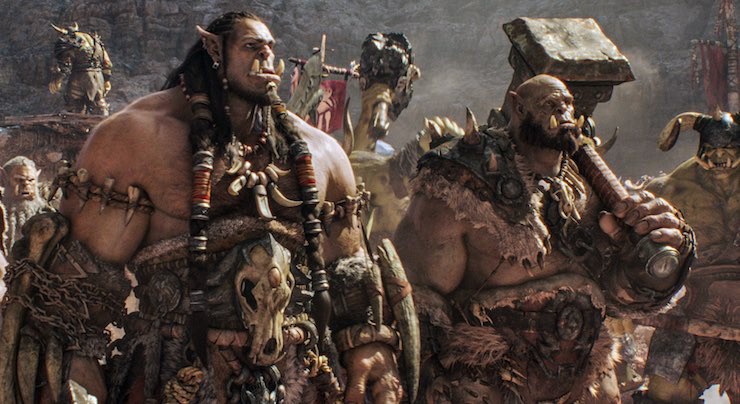
Other viewpoints are provided by Medivh, Khadgar, Garona, and Gul’dan respectively. Medivh is great fun, with Ben Foster’s offhand delivery giving the Guardian of Tirisfal an oddly Doctor Who-esque air. His relationship with Khadgar, played by Ben Schnetzer, is especially good. The rivalry between the two men is offset by genuine respect and a subtle, running gag that shows just how much Medivh trusts the mage. It also leads to a surprisingly emotional payoff in their final scene together.
Garona, played by Paula Patton, seems at first like one of the places the movie will stumble. An orc/human hybrid, she spends the first half in a furry sports bra that’s a little too “What is this Earth thing called…love?” to be taken entirely seriously.
However as the movie continues she, Lothar, Durotan, and Medivh in particular all find themselves in really interesting places. For Garona, that’s finding a measure of peace for the conflict in her own nature. She’s articulate, physically gifted, and idealistic. She’s a leader in waiting, and like the others in the movie she pays a hefty price to gain the position she’s destined for.
In fact, every one of the main character pays a terrible price for what they learn and where they end up. They all make mistakes; each mistake is understandable in context and crucially few of them are noticed, let alone resolved. This is that rare treat: a movie where no one’s read the whole script. That gives their actions, even the tragic or misguided ones, a welcome weight and context. This is a complicated story woven out of lots of very simple ones, and the script excels at showing us how history is built this way, out of good decisions, bad decisions, and the only decisions possible. That means the film doesn’t choose a side. And that means, if you like, you can.
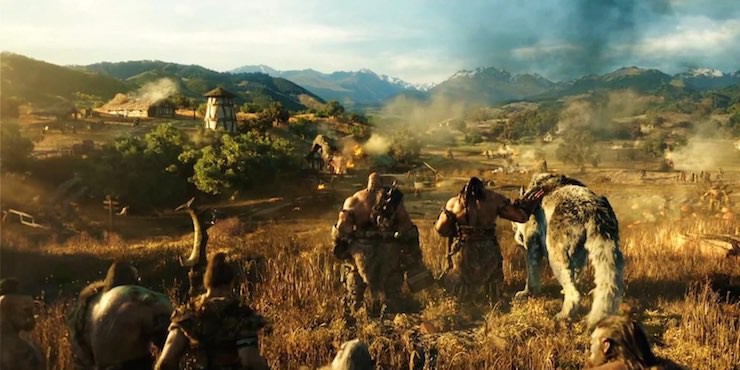
The technical aspect of the film is just as important. Fans of the games are going to geek out every couple of seconds over the Easter eggs built into this thing, but it’s successful on a much more important level than simple references. Jones has talked a lot about how he wanted to show Azeroth as a different, much smaller world than our own. In countless scenes we are shown multiple types of environments existing a few dozen miles apart, and the film’s first hour sprints along while showcasing these different types of terrain and the various factions that occupy the land. This isn’t the empty landscapes and hollow CGI of a lot of fantasy movies—this is a busy, vibrant, living world.
That sense is especially borne out by the Horde. It would have been so easy for the Horde to be faceless monsters, or empty, weightless CGI that existed solely to smother the performances of the actors beneath the motion capture. Instead, they’re unique, interesting characters. Toby Kebbell, whose star-making turn in Rock’n’Rolla is still one of my all-time favorite performances, gives Durotan both intelligence and the burden that goes along with it. Likewise, Kazinsky, consistently one of the most valuable and least recognized players in any cast, brings a welcome intelligence and moral weight to Orgrim. They’re characters, not effects, and the movie is all the better for it.
That’s not to say this movie is a home run, because it isn’t. A plot involving Lothar’s son sprints by so fast it barely registers, and it’s impossible not to wonder how much of it was cut and whether more should have followed. Similarly Gul’dan, played by Into the Badlands’ remarkable Daniel Wu feels a little shortchanged. As the master villain of the piece, his arc feels unfinished. You can see why it ultimately pans out the way it does, but that doesn’t make it any more satisfying.
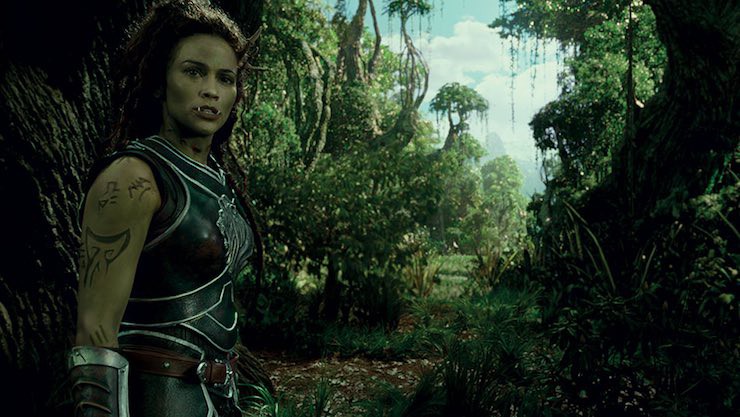
More egregiously, of the three female lead characters, only one actually gets anything to do. Garona’s arc is great, dramatically chewy stuff. Draka, Durotan’s wife, exists to have a baby, be heroic, and die. To be fair, there’s some personality to her early scenes but she still feels like a wasted opportunity, especially next to Garona. Lady Taria fares even worse, a promising pair of early scenes quickly giving way to Ruth Negga standing around waiting for the plot to happen somewhere else. This sort of waste is disappointing every time we see a new variation of it, and it’s doubly so in a movie that’s otherwise so full of pleasant surprises.
That’s the bad news. The good news is that Warcraft is so much better and so much more accessible than you may have heard. Jones has a tremendous, light touch with action that gives everything scope but never loses sight of the characters. His cast are uniformly great, and they and the script go to great pains to give every character on the screen some extra depth. Best of all, the film threads that near impossible needle: it’s filled with enthusiasm and love for its source material, but uses that to bring new people in and make the story accessible, not beat them over the head with what they don’t know. The result is a film with far more intelligence than most reviews have given it credit for and one that has a lot to offer, even if you’ve never played the games.
Alasdair Stuart is a freelancer writer, RPG writer and podcaster. He owns Escape Artists, who publish the short fiction podcasts Escape Pod, Pseudopod, Podcastle, Cast of Wonders, and the magazine Mothership Zeta. He blogs enthusiastically about pop culture, cooking and exercise at Alasdairstuart.com, and tweets @AlasdairStuart.










